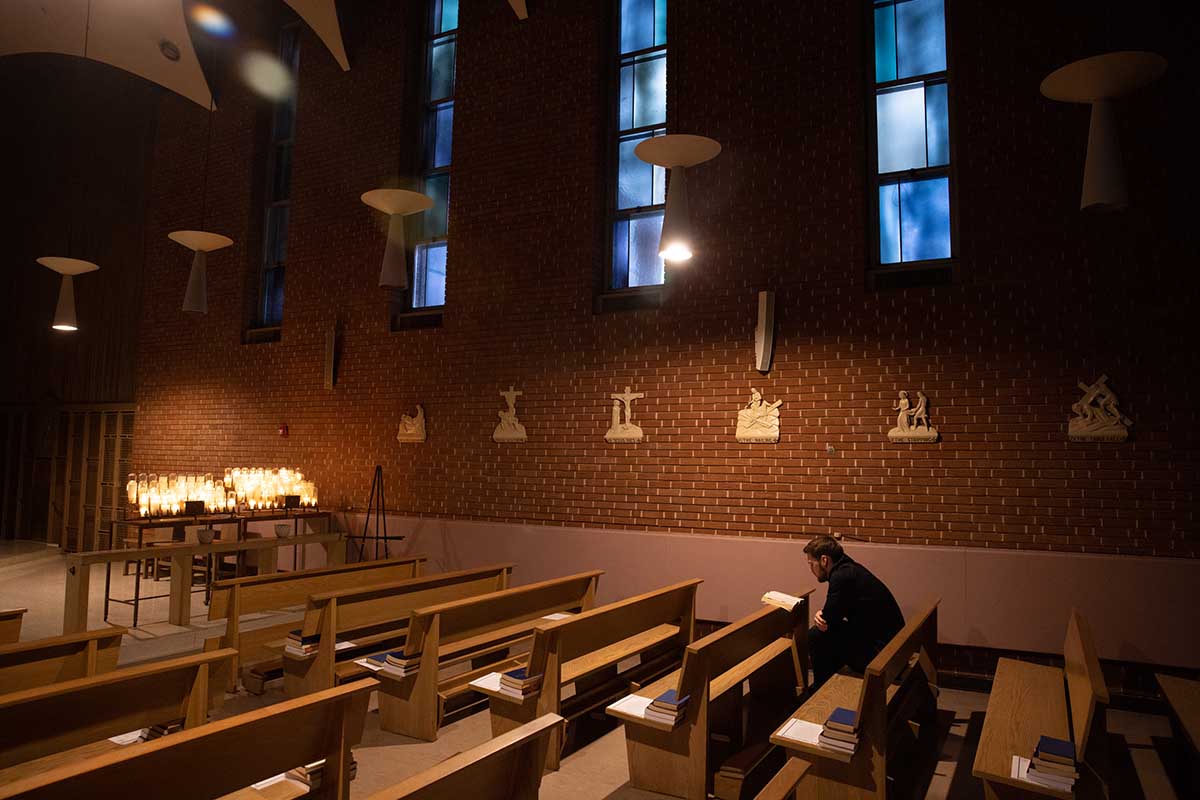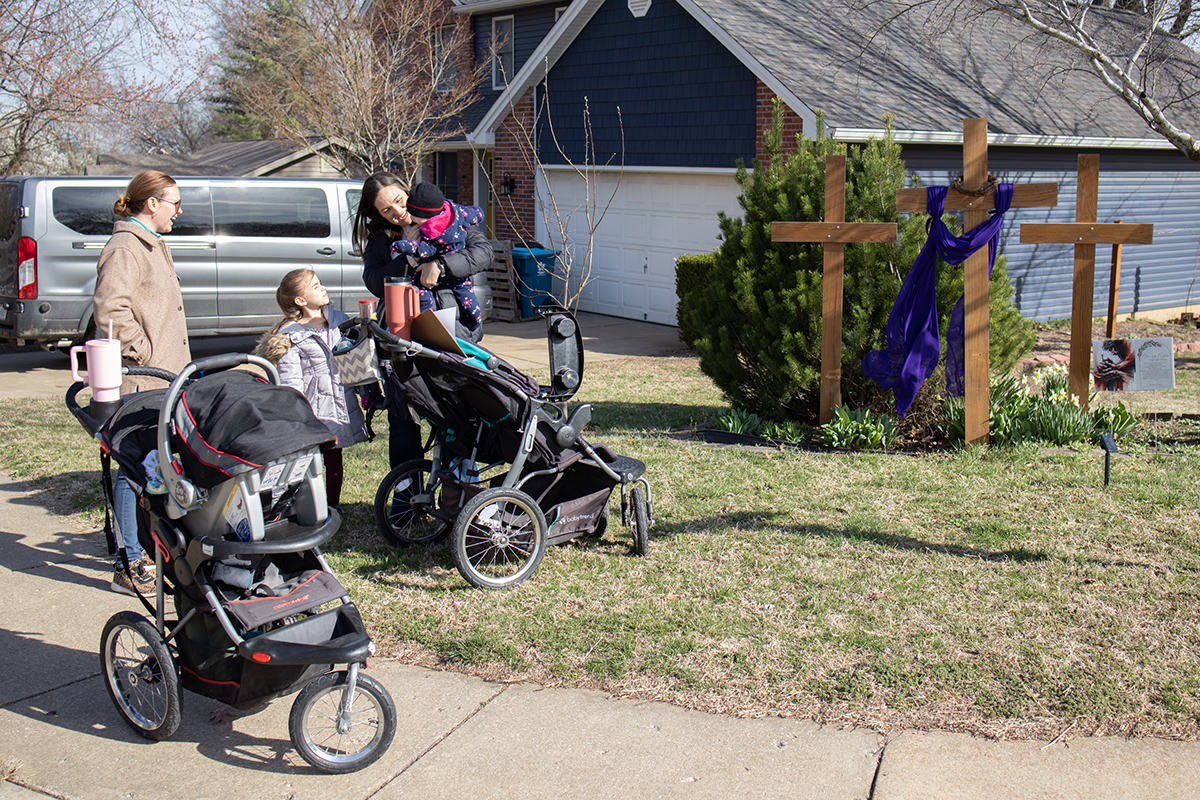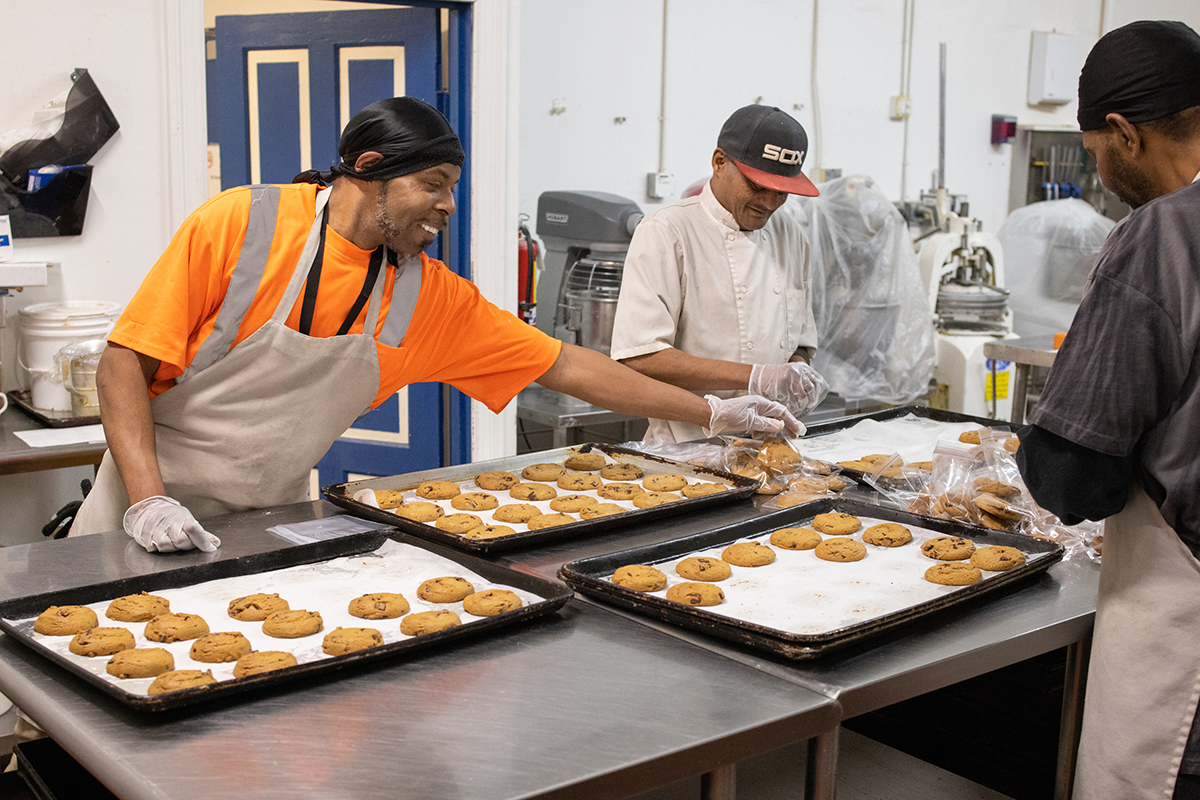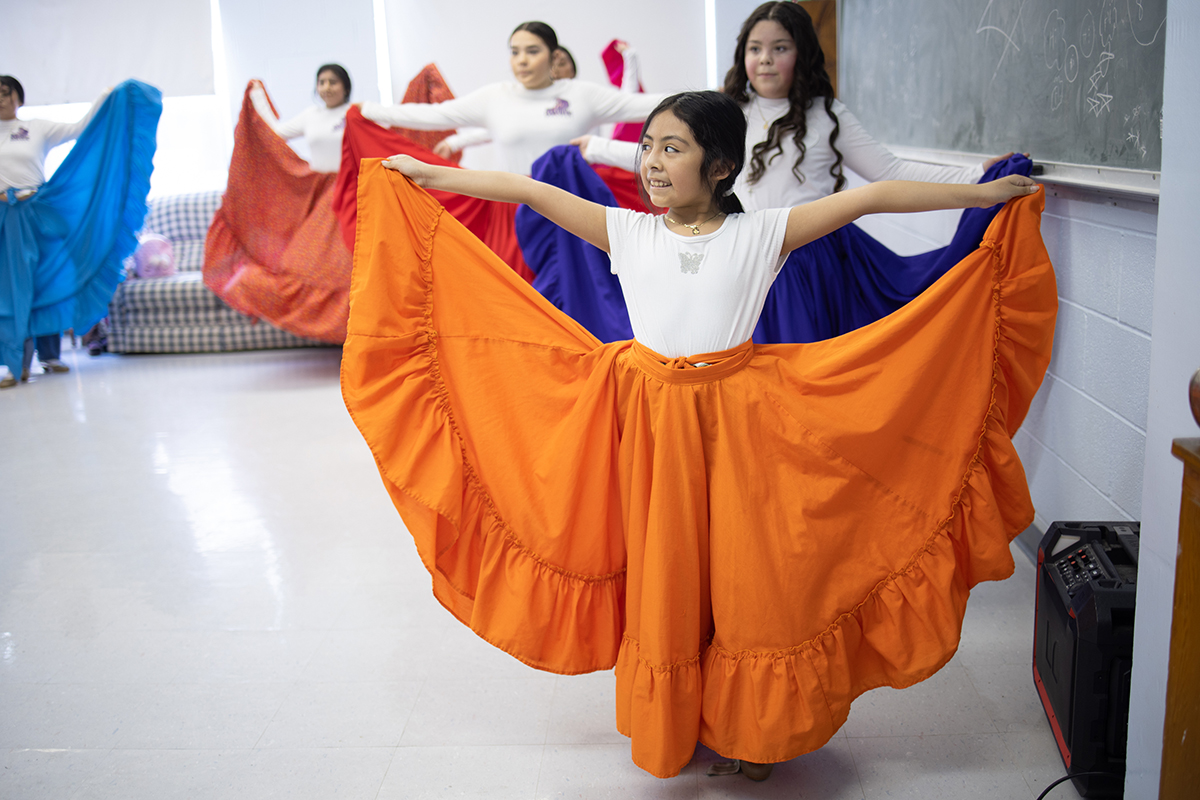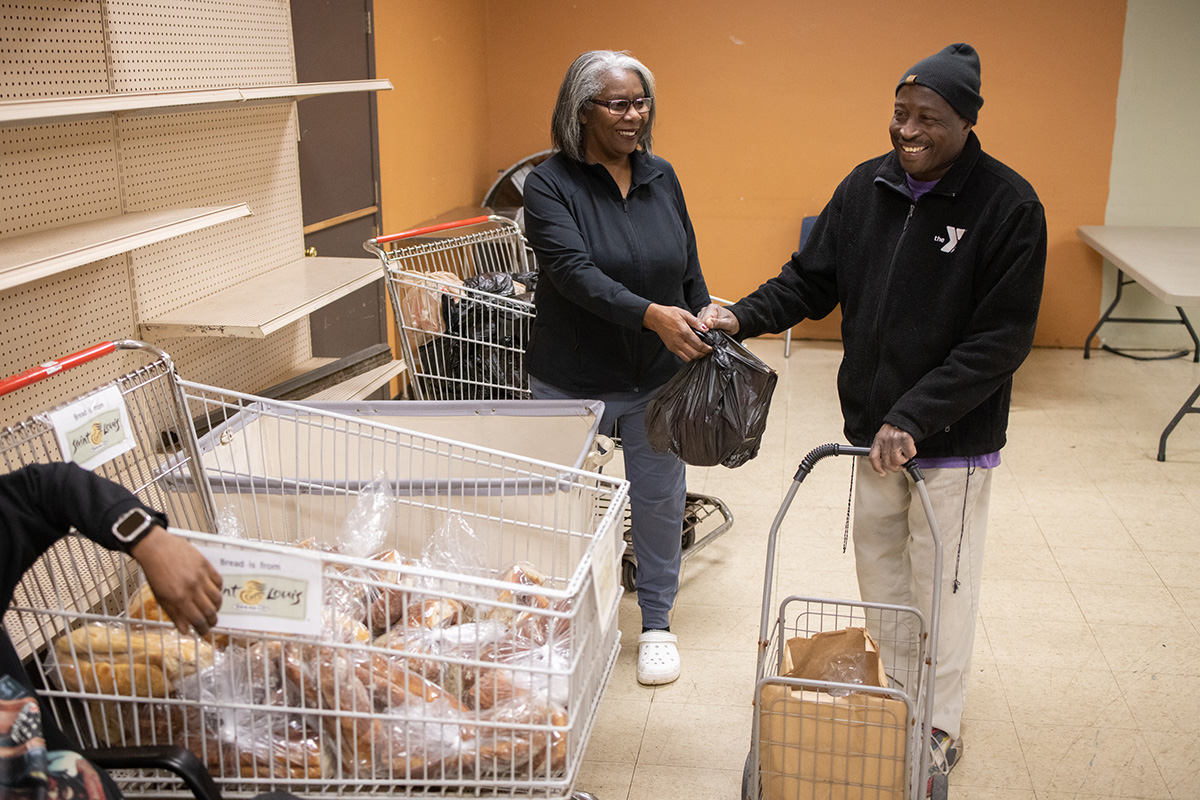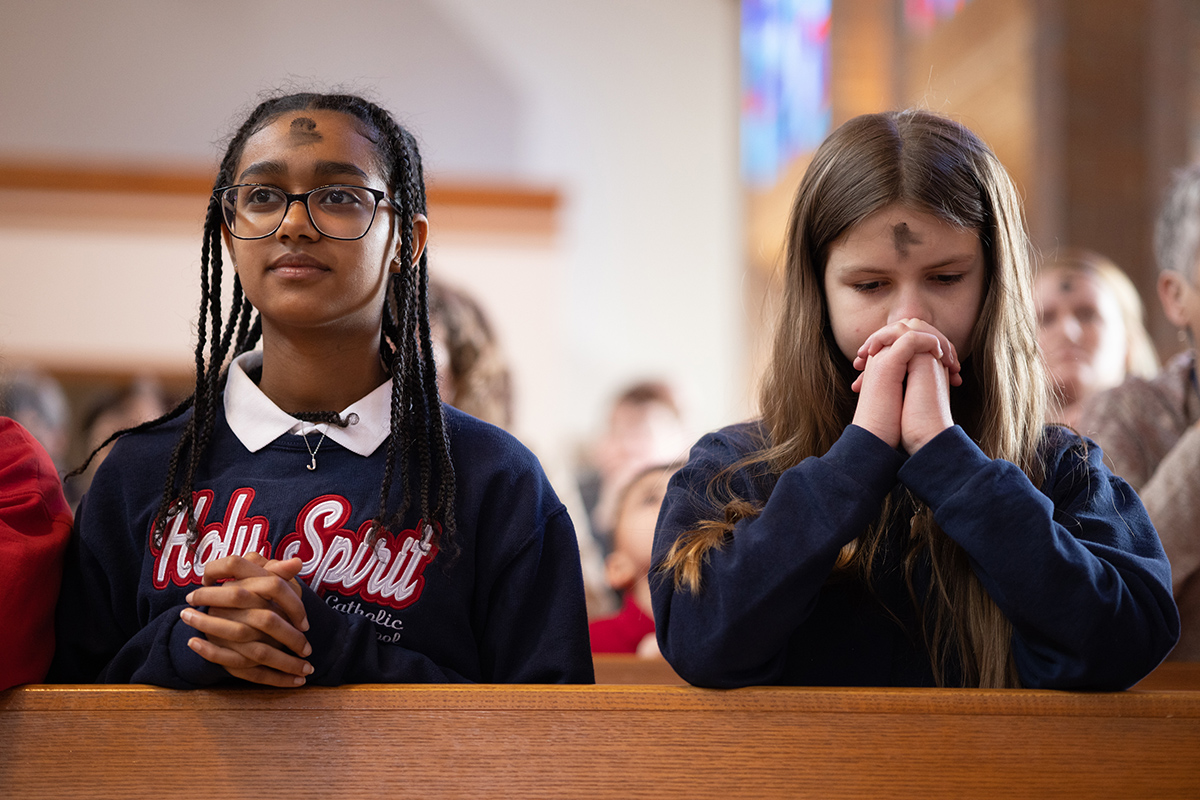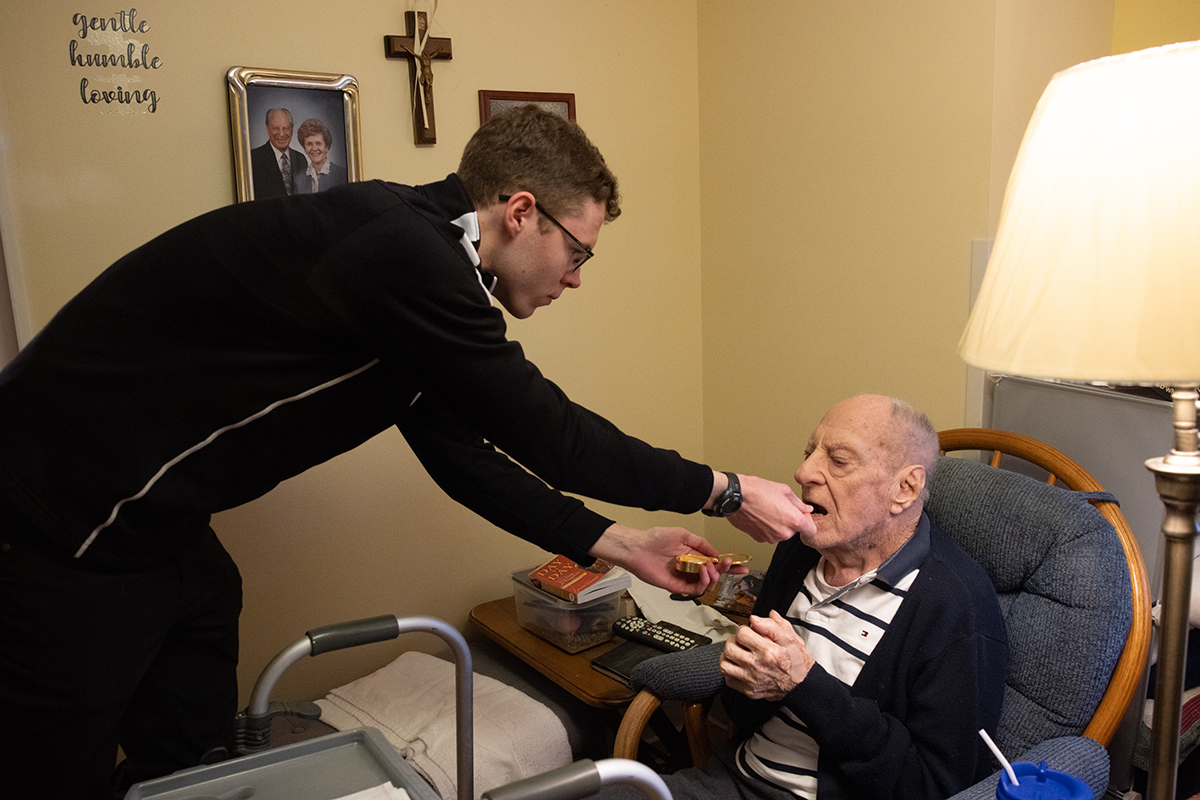Newly established orchard at Baden parish to produce fruits for the whole community
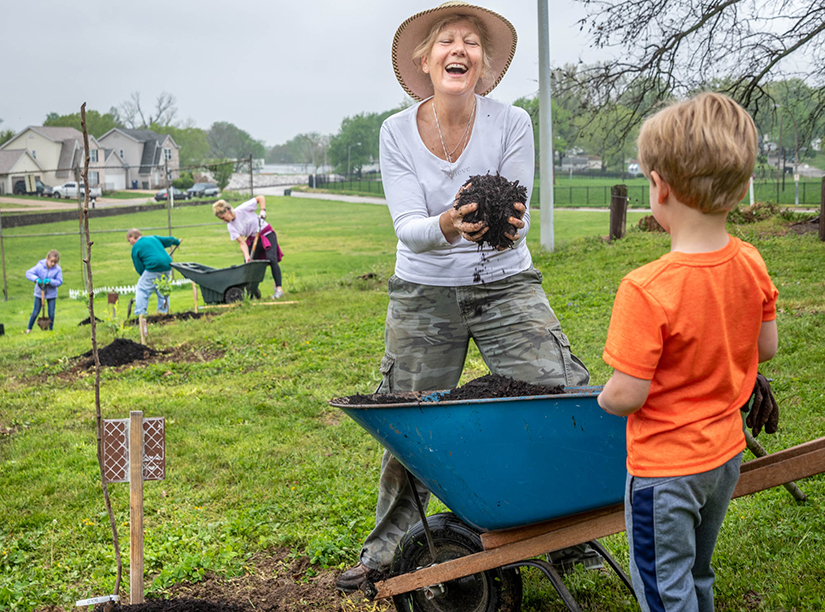
North St. Louis parish heeds pope’s message to ‘love the earth’ in planting community fruit orchard
With a small group huddled around him, Dean Gunderson demonstrated some advice for planting a fruit tree.
“You want to loosen them so they’re nice and free,” Gunderson said as he gently massaged a root ball on the end of a cherry tree plant. “You want to make sure they’re at the right depth.”
On a damp weekday morning, about two dozen members of Our Lady of the Holy Cross met on the parish grounds to plant its first fruit orchard. Gunderson, a community projects manager with Gateway Greening, led them in planting about two dozen fruit trees and bushes, which in a few years will produce an abundance of cherries, pears, apples, jujubes and peaches.
The parish, located in the Baden neighborhood of north St. Louis, is participating in the Giving Grove program, offered through Gateway Greening of St. Louis to plant sustainable community orchards in the St. Louis area. Our Lady of the Holy Cross received a scholarship from the organization to cover 90 percent of the cost of the trees, with a promise that the fruits will be shared with the community.

Citing Pope Francis’ encyclical “Laudato Si’,” Our Lady of the Holy Cross pastor Father Vince Nyman said that the project is just one small response to the Holy Father’s call for “loving the land.”
The priest said his hope is that the orchard will be something for the whole community. What Pope Francis had in mind with his encyclical is “getting back to the land and make a correlation between loving the land and loving the suffering,” Father Nyman said.
In “Laudato Si’,” Pope Francis indeed noted that in being concerned for the environment, “our goal is not to amass information or to satisfy curiosity, but rather to become painfully aware, to dare to turn what is happening to the world into our own personal suffering and thus to discover what each of us can do about it.”
The project was spearheaded by parishioners Angie and Jim Freshley, who joined Our Lady of the Holy Cross last August, after the closure of their previous parish, Our Lady of the Rosary in Spanish Lake. Father Nyman had mentioned the idea of an orchard as a way of feeding the community, and the couple ran with it.
“I think people will take interest in this,” Jim Freshley said. “When they start blooming in a few years and they start producing a lot of fruit, people will go crazy.” He recalled growing up in a rural area where fruit trees were easy to access. “When it was ripe, you’d just go up and help yourself,” he said.
The fruit orchard is the latest outdoor project for Our Lady of the Holy Cross. The parish also has participated in a native prairie restoration on the property as part of the St. Louis Riverfront Butterfly Byway, a project to establish a sweeping pollinator habitat within two miles of the Mississippi River and educate city residents about pollinator conservation. Last year, a separate garden was started, which also attracts butterflies and other pollinators. The parish worked with the City of St. Louis and organizations including Brightside St. Louis and the Missouri Botanical Garden to establish those projects.
Also on hand at the orchard planting was Barbara Graham, a neighborhood improvement specialist with the City of St. Louis’s Neighborhood Stabilization Team, which works with residents in providing assistance, education, intervention and organization within their neighborhoods.
Graham described the parish as an anchor for the community. “To me they’ve always been community driven,” she said. “Anything to revitalize Baden — Father Vince and his team, they’re always on it. They’re very involved, very active.”
Angie Freshley described the outdoor projects as a sign of hope and new life for the Baden area. “We’re trying to give hope to this area and keep this church open,” she said. “I envision this being a good place for families to come,” she said of the
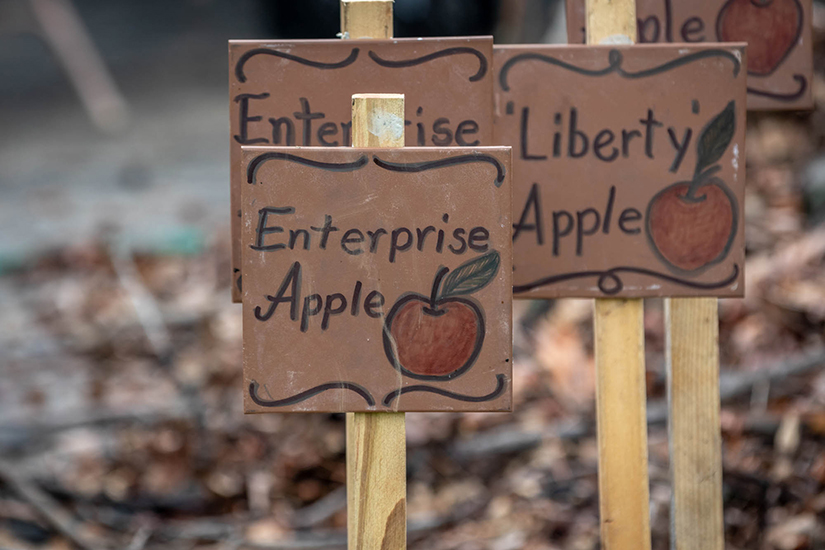
orchard. “My kids loved to go apple picking. Wouldn’t it be great have it in your own backyard?”
>> The Giving Grove
Gateway Greening announced a partnership in 2017 with the Giving Grove in Kansas City, Mo., to plant sustainable community orchards in St. Louis. A Giving Grove orchard, with an average of 15 trees, is capable of producing more than 3,500 pounds of produce each year, providing food insecure families fresh, organic fruit and nuts for 25 plus years.
The Giving Grove began in 2013 as a pilot program of Kansas City Community Gardens in Kansas City, Mo. Since its start, more than 160 community orchards have been planted, which are already producing fruit. The total production potential of these orchards is over 650,000 pounds per year, or 16.5 million pounds during the trees’ lifetime. The St. Louis program is expected to meet (or exceed) these yields in just five years.
The mission of Gateway Greening of St. Louis is to educate and empower people to strengthen their communities through gardening and urban agriculture. The organization supports more than 200 community gardens and food projects as well as more than 60 school gardens in the St. Louis, Missouri metropolitan area, and operates the 2.5-acre Gateway Greening Urban Farm in downtown St. Louis.
>> Harvesting and the Bible
There are examples of growing and harvesting fruit in biblical times. The Book of Leviticus includes a passage about the importance of delaying the harvest in order to yield better fruit:
“When you come into the land and plant any fruit tree there, first look upon its fruit as if it were uncircumcised. For three years, it shall be uncircumcised for you; it may not be eaten. In the fourth year, however, all of its fruit shall be dedicated to the Lord in joyous celebration. Not until the fifth year may you eat its fruit, to increase the yield for you. I, the Lord, am your God” (Leviticus 19:23-25).
The significance of fourth-year fruit also is addressed within Jewish Law. The forbidden fruits are called “orlah” in Hebrew, which means uncircumcised. Over the centuries, it’s been established as good practice in agriculture, to ensure good harvests later down the road as the trees/shrubs matured.
According to the Cambridge Dictionary of Judaism and Jewish Culture, “The biblical law of ‘uncircumcised’ fruit (orlah) prohibits consuming fruit picked from a tree in the Land of Israel within three years of its planting (Leviticus 19:23). According to rabbinic interpretation of ‘fourth-year planting’ (neta revai) … may only be eaten in Jerusalem unless it is redeemed.”

All people of good will have an obligation to care for the environment with respect and concern
Pope Francis’ message in “Laudato Si’” still resonates four years after its release
BY CINDY WOODEN | Catholic News Service
VATICAN CITY — The earth, which was created to support life and give praise to God, is crying out with pain because human activity is destroying it, Pope Francis wrote in his encyclical, “Laudato Si’, on Care for Our Common Home.”
All who believe in God and all people of good will have an obligation to take steps to mitigate climate change, clean the land and the seas, and start treating all of creation — including poor people — with respect and concern, he says in the document, which was released four years ago in 2015.
A lack of respect for creation is a lack of respect for God who created all that exists, the pope states. In fact, he continues, a person cannot claim to respect nature while supporting abortion, nor can one claim to be pro-life without a commitment to reversing damage to the environment.
With blunt language, the pope decries centuries of exploiting the earth, exploiting other people and acting as if the point of human life is to buy and consume as much as possible.
“The earth, our home, is beginning to look more and more like an immense pile of filth,” the pope writes in the document.
Although the Church does not pronounce on properly scientific matter, Pope Francis states “a very solid scientific consensus” points to global warming and indicates “human activity” has seriously contributed to it, threatening the planet and all life on it.
Regarding pollution and environmental destruction in general, he states it is important to acknowledge “the human origins of the ecological crisis,” and while ecology is not only a religious concern, those who believe in God should be especially passionate on the subject because they profess the divine origin of all creation.
People are fooling themselves, Pope Francis wrote in the document, if they think “things do not look that serious, and the planet could continue as it is for some time.” Such people in all honesty are giving themselves permission to carry on with their current lifestyles and habits; their attitude is “self-destructive,” he says.
In large sections of the encyclical, Pope Francis’ language is poetic, echoing the tone of St. Francis of Assisi’s “Canticle of the Creatures,” which is the source of the “laudato si’” (praised be you) in the encyclical’s title. He quotes a large section of the hymn of praise in a section on the place of each creature in the harmony of creation. The canticle is most famous for its references to “Brother Sun,” “Sister Moon” and “our sister, Mother Earth.”
But, the pope says, “sister earth” is crying out, “pleading that we take another course” marked by healing and protecting the earth and all its inhabitants.
While Christians cannot “put all living beings on the same level nor … deprive human beings of their unique worth and the tremendous responsibility it entails,” St. Francis’ hymn expresses the truth that God is creator of all things, that every part of creation speaks of God’s love and power and that every created being is part of interdependent whole, the pope writes.
In the document, Pope Francis calls on national governments and the leaders of international institutions to be serious and courageous in adopting strict measures to slow and reverse global warming, protect the rain forests and ensure the availability of clean water for all. Courage will be needed, he says, to adopt policies that initially may slow the pace of economic growth, but which will be farsighted in ensuring a future for their voters, their voters’ grandchildren and all humanity.
“We know that technology based on the use of highly polluting fossil fuels — especially coal, but also oil and, to a lesser degree, gas — needs to be progressively replaced without delay,” he says.
But he also calls on every Catholic and all people of good will to do their part by, for example, using only non-polluting detergents, recycling paper, using public transportation and putting on a sweater instead of raising the heat in the winter.
And he urges Catholics to return to the practice of saying grace before meals, a habit that reminds them regularly that the food they are about to eat is a gift that comes from the earth and from God.
>> Read more
To read “Laudato Si’” in its entirety, visit bit.ly/1Gi1BTu
Find more information from the U.S. Conference of Catholic Bishops on the encyclical at www.usccb.org/environment
With a small group huddled around him, Dean Gunderson demonstrated some advice for planting a fruit tree. “You want to loosen them so they’re nice and free,” Gunderson said as … Newly established orchard at Baden parish to produce fruits for the whole community
Subscribe to Read All St. Louis Review Stories
All readers receive 5 stories to read free per month. After that, readers will need to be logged in.
If you are currently receive the St. Louis Review at your home or office, please send your name and address (and subscriber id if you know it) to subscriptions@stlouisreview.com to get your login information.
If you are not currently a subscriber to the St. Louis Review, please contact subscriptions@stlouisreview.com for information on how to subscribe.

